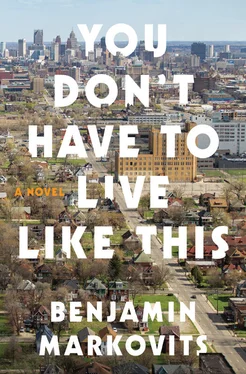When I mentioned this to Beatrice at the time, she said, “Bullshit, it’s got nothing to do with race, it’s a gender thing, it’s because they were all women. You don’t think women want to have sex.”
But I wasn’t sure. “I don’t know,” I said.
I suddenly remembered this conversation, which I hadn’t thought about for years, while walking home from Kettridge High. This is strange, because at the time it made a big impression. I was still a virgin, sex wasn’t something I liked to talk about, and the way those women cheered the two guys on was something new to me. The fact that they were black, the fact that everybody seemed to be having a good time, that no one looked ashamed, all that was part of the impression, and I wondered if it had anything to do with my attraction to Gloria.
Our neighborhood was probably the most middle-class neighborhood in the whole setup. Walter nicknamed us the “burnt ends.” There was Hector Cantu’s crowd, Latinos of one stripe or another, legal and illegal — Robert’s lawyers had fixed things pretty well with the ICE. Everyone called their neck of the woods Little Mexico. Then there was a kind of global village, people from Iraq, Somalia, Sudan, most of them refugees, living cheek by jowl with each other, about twenty blocks east of Johanna Street in the Marina District. That was the smallest block. Probably the weirdest development was out by the old Wayne Conner plant, which had been bought up by a social networking company.
They turned part of the plant into a server farm and filled all of the surrounding residential streets with their employees, who moved from shitty and expensive apartments in the Bay Area to houses in Detroit. Then out by the old airport was another mixed bag of middle-aged dropouts, more burnt ends. People sometimes talked about the “five neighborhoods.” Already restaurants were opening, food markets, street bazaars and bars — you met up in the places getting a reputation. Walter and I used to go for breakfast at a Somalian café in the Marina. It served cheap polenta porridge, which Walter had become obsessed with. We drank tea and ate the porridge and read the Detroit Free Press ; Walter was looking for part-time jobs.
The last piece of the puzzle was a stretch of dead land around I-94, not far from Kettridge High, which a guy called Franklin Mayer wanted to turn into an urban farm. Franklin was a friend of Robert’s. His father was somebody at Chrysler. He went to law school after college but dropped out and started using his moderate inheritance to buy up real estate. I met him once at Robert’s place in New York. A big, bluff, red-faced, genial guy, rich-sounding and good-looking, a kind of American gentleman. He had the talking habit of somebody with not enough to do. If you needed to drive somewhere he was happy to come along. But he also had practical talents and saved money by fixing up his properties himself. He taught himself basic plumbing, a little carpentry, something about electrics and gardening. His hands were always chapped and dirty under the nails.
Franklin talked a lot about real estate, he thought about it a lot, and got out at just the right time, before the crash, and ended up with a big pile of dough. More than he needed or wanted, he said. He wanted to do something “real” with this money, something political that didn’t pander to party. So he started this farm. A lot of people I knew made cash in hand by working on it, breaking ground, tearing down houses, building fences, etc. In the early stages there was plenty of work to go around. You showed up in the morning and somebody gave you something to do, and at the end of the day you got paid. Sometimes I worked there, too.
It served a useful community function. A litigator from Chicago might dig ditches with a factory hand from Kismaayo. The farm was one of the places where people from different neighborhoods got to know each other.
This was easy enough on your own street. Living opposite Walter and me was a gay couple, both in their forties. One guy used to work in IT but wanted to write plays; I think he still freelanced to pay the bills. Sandy Brinkman, from Seattle. His boyfriend, Tomaso, was Venezuelan by birth, a landscape gardener. Everyone on our block got to know him — he offered to help us with our yards.
Next door were the Mogfords, Hazel and Jayson. She was a post office administrator; he used to run a construction company. They were both black, she was maybe a little lighter-skinned. Jayson’s company expanded too quickly in the boom and went bust in the bust, just after they moved into a new house, but they managed to get through all that without ending up on different sides.
“It got to that point you all read about,” Hazel said to me. She had a soft southern accent, the kind that made me miss Baton Rouge, and wore her hair straightened and bright red lipstick. “We owed more than the place was worth. I’ll tell you what we did. We packed what we wanted to keep in Jayson’s van, then I walked up to the front door, I’ll not forget this, and put our keys through the slot. Then we drove to my mother’s house in Louisville. If we had stayed there much longer we’d have got divorced.”
They had two kids, two boys, and sometimes their football ended up in our backyard. I played a little catch with them. Walter and I had dinner there, too, several times. When my washing machine broke down and started leaking through the ceiling onto Walter’s bedroom, Jayson came by and fixed things up for us, for about fifty bucks. People helped each other out. We had time and didn’t need much money. Their older boy was ten years old, but very advanced mathematically, and sometimes I gave him a hand with his homework. They both went to Bert and Ingrid’s new school.
Robert insisted on keeping up a black presence in the neighborhoods, partly for PR reasons. But it wasn’t just that. I talked to people who came back to Detroit because it meant something to them, as a black city. People had family here, they wanted to make it work. Jayson’s great-grandfather grew up in Elmwood Park, just the other side of the cemetery, about a half-hour walk away. There were also a lot of mixed-race couples. Kurt Stangel’s wife turned out to be Nigerian, but rich Nigerian. They met at Northwestern Law School. She was shy, attractive, very dark, and also quite religious; they spent their first few months in Detroit looking for a church.
Next door on the other side lived a Jewish family, the Rosens, a dentist and his wife with three kids, including a six-month-old baby. The dad was big, loud, fat and bald. He was one of those guys who looks funny in jeans, because they sit very high on his waist, held up by a belt, but he wore them every day, even when working. Along with New Balance sneakers and a Cornell sweatshirt. Sometimes he practiced “informally,” as he called it, from an office in his den, but the truth is, they had made a reasonable return on selling their house in Orange County, New York. He wanted to sit on his ass and throw a baseball around with his older boy, and take him to Tigers games. Cynthia, his wife, was small, olive-skinned, shrill, with a faint, faint mustache over her lip and more soft hairs along her neck, under the jaw. Their kids were called Benny, Miriam and baby Solly.
Jack, the father, probably had the best description of what we were doing. “We’re settlers,” he said. “There were boys I knew from synagogue in Port Jervis, who when they were all grown up and sick of their American lives, said fuck this and moved to Katzrin, where they sit on their tushes and make more kids. With everything paid for by the Jewish state. I said to my wife, I want a piece of this action, and she said, there’s only one problem. You’re not a religious nut. But here it doesn’t matter,” he said. “Here you just have to be nuts.”
Читать дальше












